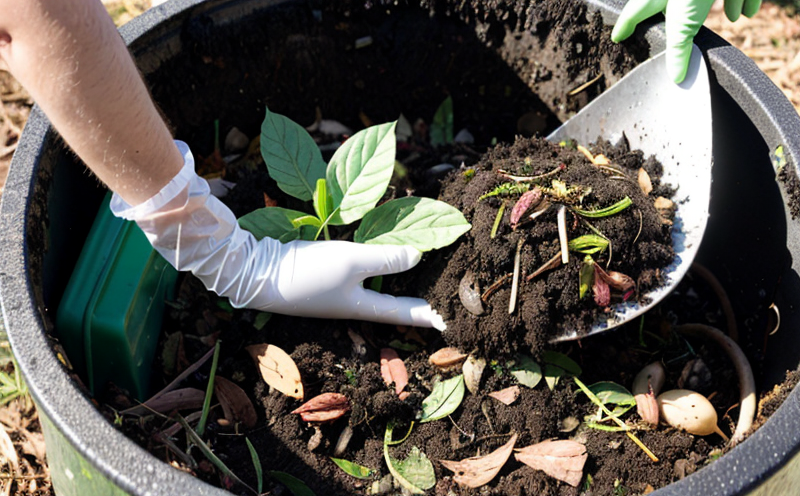EN 13432 Biodegradation Testing of Compostable Plastics
The European standard EN 13432 specifies the requirements for packaging intended to be composted by industrial means. Compliance with this standard ensures that products are biodegradable and do not contain substances harmful to the environment during composting, thus promoting sustainable waste management practices.
Biodegradation testing according to EN 13432 is crucial for waste management as it evaluates whether packaging materials break down into harmless elements within industrial composting conditions. This process involves exposing samples to controlled environments that simulate real-world composting conditions, including temperature, humidity, and microbial activity.
The standard outlines specific protocols to ensure accurate assessment of the biodegradability of plastics. Samples are incubated under defined conditions for a set period, after which their mass loss is measured. A minimum percentage of carbon must be mineralized into CO2 within 180 days to meet the criteria for compostable materials.
Composting facilities rely on this testing to verify that packaging materials can degrade efficiently and safely in industrial composting systems. This not only aids in reducing landfill waste but also supports circular economy principles by ensuring that biodegradable products are properly managed at the end of their lifecycle.
Accurate measurement is critical during EN 13432 testing, as even slight deviations can lead to misinterpretation of results. Our laboratory adheres strictly to these protocols using state-of-the-art equipment and trained personnel to ensure reliable test outcomes.
In summary, compliance with EN 13432 is essential for manufacturers aiming to produce sustainable packaging solutions. By conducting biodegradation testing, we help our clients verify the environmental friendliness of their products while adhering to regulatory requirements.
Scope and Methodology
The scope of EN 13432 biodegradation testing includes evaluating packaging materials designed for composting in industrial facilities. This test assesses the ability of these materials to degrade completely into harmless substances, specifically carbon dioxide (CO₂) and water.
The methodology involves several key steps:
- Sample Preparation: Packaging samples are cut into small pieces that can easily be dispersed in the composting medium.
- Composting Conditions: Samples are incubated under controlled conditions mimicking industrial composting environments, including temperature and humidity levels.
- Mass Loss Measurement: The weight of the samples is measured at regular intervals throughout the test period. A minimum 90% mass loss by CO₂ formation over a period of 180 days is required for compliance.
- Residue Analysis: Any remaining residues are analyzed to ensure they do not contain hazardous substances.
This comprehensive approach ensures that the tested materials meet stringent biodegradability standards, thereby supporting sustainable waste management practices.
Eurolab Advantages
Our laboratory offers unparalleled expertise in EN 13432 testing, ensuring accurate and reliable results that meet the highest industry standards. Here are some of the key advantages:
- ISO/IEC Accreditation: We maintain ISO/IEC accreditation for our laboratories, guaranteeing consistent quality across all test procedures.
- State-of-the-Art Equipment: Our facilities house advanced analytical instruments capable of precise measurement and analysis.
- Experienced Staff: Our team consists of highly trained professionals with extensive experience in biodegradation testing.
- Prompt Turnaround Times: We prioritize timely delivery of results to minimize the impact on your project timeline.
- Comprehensive Reporting: Our reports provide detailed insights into the test outcomes, helping you make informed decisions.
- Supportive Consultation: Our experts are available for consultation throughout the testing process, ensuring that every step aligns with your specific needs.
By leveraging these advantages, we help our clients achieve compliance with EN 13432 and other relevant standards, thus contributing to their overall sustainability goals.
Customer Impact and Satisfaction
Our commitment to excellence in biodegradation testing has a significant positive impact on our customers. By ensuring compliance with EN 13432, we help manufacturers:
- Meet regulatory requirements for sustainable packaging solutions.
- Avoid potential legal challenges associated with non-compliance.
- Enhance brand reputation through the promotion of environmentally friendly products.
- Increase market access to regions that favor eco-friendly materials.
We strive to exceed our customers' expectations by delivering accurate, timely results and offering expert advice throughout the testing process. This dedication has earned us a high level of customer satisfaction, as evidenced by positive feedback from past clients.
Our focus on quality and reliability not only supports environmental sustainability but also fosters trust in your products among consumers who prioritize eco-friendly options.





